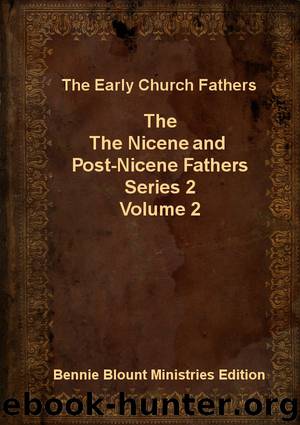Nicene and Post-Nicene Fathers Series 2 Volume 2 by Early Church Fathers

Author:Early Church Fathers [Fathers, Early Church]
Language: eng
Format: epub
Tags: Early Church Fathers
Publisher: Bennie Blount Ministries
Published: 0101-01-01T00:00:00+00:00
Whether the Egyptians or others are to be regarded as the founders of this philosophy, it is universally admitted that Antony,44 the great monk, developed this course of life, by morals and befitting exercises, to the summit of exactness and perfection. His fame was so widely spread throughout the deserts of Egypt, that the emperor Constantine, for the reputation of the man's virtue, sought his friendship, honored him with correspondence, and urged him to write about what he might need. He was an Egyptian by race, and belonged to an illustrious family of Coma, which was situated near the Heraclea which is on the Egyptian borders.45 He was but a youth when he lost his parents; he bestowed his paternal inheritance upon his fellow-villagers, sold the rest of his possessions and distributed the proceeds among the needy; for he was aware that philosophy does not merely consist in the relinquishment of property, but in the proper distribution of it. He obtained the acquaintance of the devoted men of his time, and emulated the virtues of all. Believing that the practice of goodness would become delightful by habit, though arduous at the outset, he reflected on more intense methods of asceticism, and day by day he augmented it by self-control just as if he were always recommencing his undertaking. He subdued the voluptuousness of the body by labor, and restrained the passions of the soul by the aid of the Divine wisdom. His food was bread and salt, his drink water, and he never broke his fast till after sunset. He often remained two or more days without eating. He watched, so to speak, through-out the night, and continued in prayer tilldaybreak. If at any time he indulged in sleep, it was but for a little while on a short mat; but generally the bare earth was his couch. He rejected the practice of anointing with oil, and the use of baths and of similar luxuries likely to relax the tension of the body by moisture; and it is said that he never at any time saw himself naked. He neither possessed nor admired learning, but he valued a good understanding, as being prior to letters and as being the very discoverer of it. He was exceedingly meek and philanthropic, prudent and manly; cheerful in conversation and friendly in disputations, even when others used the controverted topics as occasion for strife. By his own habit and a kind of intelligence he quieted contentiousness when on the increase, and restored them to moderation; he also tempered the ardor of those who conversed with him, and regulated their manners. Although on account of his extraordinary virtues, he had become filled with the Divine foreknowledge, he did not regard foreknowledge of the future as a virtue, nor did he counsel others to seek this gift rashly, for he considered that no one would be punished or rewarded according to his ignorance or knowledge of futurity; for true blessedness consists in the service of God, and in keeping his laws.
Download
This site does not store any files on its server. We only index and link to content provided by other sites. Please contact the content providers to delete copyright contents if any and email us, we'll remove relevant links or contents immediately.
The Gnostic Gospels by Pagels Elaine(2527)
Jesus by Paul Johnson(2352)
Devil, The by Almond Philip C(2324)
The Nativity by Geza Vermes(2226)
The Psychedelic Gospels: The Secret History of Hallucinogens in Christianity by Jerry B. Brown(2148)
Forensics by Val McDermid(2087)
Going Clear: Scientology, Hollywood, and the Prison of Belief by Lawrence Wright(1976)
Going Clear by Lawrence Wright(1962)
Barking to the Choir by Gregory Boyle(1819)
Old Testament History by John H. Sailhamer(1809)
Augustine: Conversions to Confessions by Robin Lane Fox(1769)
The Early Centuries - Byzantium 01 by John Julius Norwich(1736)
A History of the Franks by Gregory of Tours(1719)
A Prophet with Honor by William C. Martin(1717)
Dark Mysteries of the Vatican by H. Paul Jeffers(1704)
The Bible Doesn't Say That by Dr. Joel M. Hoffman(1676)
by Christianity & Islam(1627)
The First Crusade by Thomas Asbridge(1601)
The Amish by Steven M. Nolt(1562)
